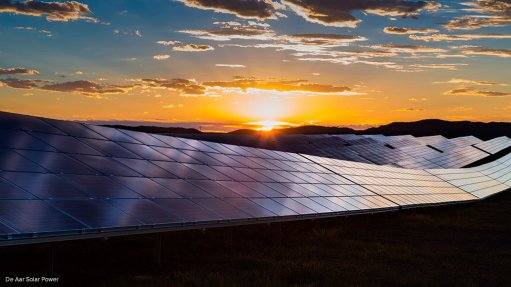
On the heels of Energy Minister Tina Joemat-Pettersson’s recent announcement of the preferred bidders under the fourth bidding round of the Renewable Energy Independent Power Producer Procurement Programme (REIPPPP), renewable-energy specialists, energy policymakers and successful bidders will next month gather to discuss key developments in South Africa's nascent energy sector.
The Renewable Energy Forum South Africa (Refsa), which takes place in Johannesburg on May 5, will bring together some of the biggest winners under the REIPPPP’s most recent window, including Norwegian solar power producer Scatec Solar, which would build 258 MW worth of solar capacity.
Also in attendance would be Department of Energy (DoE) independent power producer (IPP) unit head Karen Breytenbach and DoE acting director-general Dr Wolsey Barnard, who would deliver an address on the various departmental programmes geared at addressing energy security in South Africa.
“While the event is traditionally focused on renewables, the programme this year has been expanded to reflect the evolution of the South African energy sector and the expansion of the IPP programme to include coal, gas and nuclear projects.
“With a total of 49 photovoltaic proposals and 23 onshore wind proposals, the fourth bidding round indicated substantial investor interest in the REIPPPP,” event producer DLO Energy Resources Events said in a preview statement this week.
Refsa founder Linda Mabhena-Olagunju added that emphasis also needed to be placed on the progress made and challenges faced by energy producers in other sectors, such as nuclear, coal and gas.
Moreover, the further announcement by the DoE that it planned to expand the renewable-energy programme and shorten procurement processes over the next year in an effort to accelerate the availability of energy capacity dovetailed with the topics under discussion at the event, she noted.
“The recent announcement by the Minister could not have come at a [more] perfect time, as we now are at a phase, as IPPs, where we can fully assess the progress of the industry and measure the significance of its contribution to the grid,” said Mabhena-Olagunju.
The event would also focus on funding for black developers, following on a key policy decisions by the DoE to increase the participation of black developers, particularly under the coal IPP programme, which required at least 30% black ownership.
A fundamental question that remained, she argued, was whether development finance institutions, such as the Industrial Development Corporation, the Development Bank of South Africa and the Public Investment Corporation, would have enough funding for these programmes in future.
“While, as black developers, we welcome the increased participation requirements, it is important that there is also a higher funding pool that is affordable to enable black developers to be able to put competitively priced projects for bidding. The cost and accessibility of funding is crucial,” Mabhena-Olagunju commented.